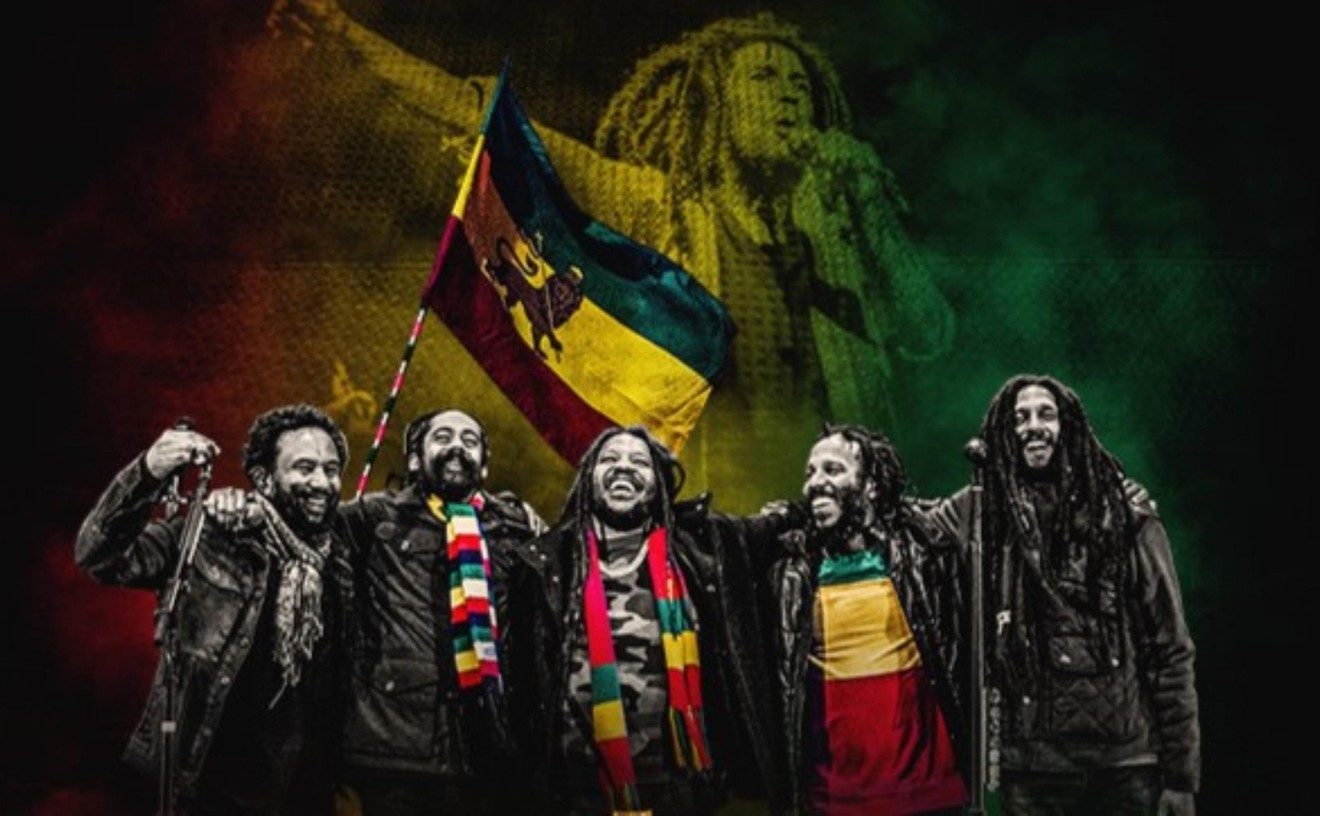In 1986, as American singer/songwriter Paul Simon was about to release his Afro-pop manifesto Graceland, one of Simon's inspirations was about to hang it up. Born Simon Nkabinde, but known by his stage name Mahlathini, this spry, 55-year-old Zulu is to African popular music what Dylan or the Beatles are to rock in the West. He is widely credited with inspiring a generation of African performers.
But by the late Eighties, 30 years after his recording debut, Mahlathini was at a low ebb. His style of music, Mbaqanga, a delicious, danceable form of African pop, was waning in popularity at home in South Africa. Sappy American disco and vapid European technopop had taken over the airwaves and the dance floors. Living in near poverty without even a bicycle for transportation, Mahlathini was considering the unthinkable for a performer anywhere-landing a day job. But before he officially disbanded his singers, the Mahotella Queens, and his Makgona Tshole Band, he recorded one last session. That last session wound up on an anthology called The Indestructible Beat of Soweto. Released after Graceland, it benefited from the post-Graceland rush to embrace everything African. Its success sealed Mahlathini's comebackand saved him from gainful employment. Practically overnight, Mahlathini was besieged by foreign concert promoters. He and the Queens embarked on several world tours, culminating in his first American performances in 1989.
His popularity abroad awakened new interest in his music at home. Suddenly, albums of his music that had been out of print or unavailable outside Africa received wide distribution in Europe and the U.S. To Mahlathini's astonishment, some discs even began toe-tapping their way up Billboard's new world-music chart.
In the past few years, world music has become one of the fastest-growing parts of the business. Record labels like Island and Shanachie have prospered because of it. Jaded by too much Depeche Mode electronics or Madonna gloss, Western music fans have made it hip to turn to a cross-cultural experience for relief. Like the overworked "alternative" label, the term "world music" is a misnomer. Driven by the tunnel vision that sees anything outside this country as an ethnic experience, the music business includes in world music everything from Balinese gamelan bands to the Chieftains, from Sufi love poetry to Oriental funk.
The widest variety of world music comes from Africa. And because most African pop-music stars tour, African music is also the best known. Musicians like Senegalese vocalist Youssou N'Dour, Nigerian singer/guitarist King Sunny Ade and the South African vocal group Ladysmith Black Mambazo are known the world over. African music varies widely in the way it sounds and what it says. Its styles follow ethnic and linguistic borders; it ranges from slow drumming and folk singing reminiscent of its new-world offspring, the blues, to jumpy dance music like Juju and Township Jive. The dance-oriented styles of African music, like Mahlathini's Mbaqanga, mix Western influences like Motown harmonizing, electric guitars and, in recent years, reggae, with traditional drumming and lyrics in a native language. And although it can be darkly political, with calls to violence and expressions of pent-up rage, African pop's major charm is the outright joy embodied in its irresistible grooves. To Western ears, these insistent rhythms can sound repetitive. But on a closer listening, African music reveals some of the most advanced vocal improvising and complex rhythms of any music on earth. But beyond the rhythms and melodies, African popular music is deeply entwined with the foundations of modern African culture. It brings the news, preserves history and, lately, preaches solidarity and active resistance against injustice.
Nowhere has African popular music been more politically inspired than in South Africa. As the embodiment of that country's rich musical heritage, the agile, 55-year-old Mahlathini uses his unearthly vocal instrument to get his "one-heart, one-love" political messages across. Nicknamed "The Lion of Soweto" because of his voice, his groaning, growly baritone is often compared to that of American blues great Howlin' Wolf. Mahlathini is the master of Mbaqanga, or Township Jive, a form marked by its stuttering guitars, jerky syncopations and call-and-response vocals. Overall, it has a sound that to Western ears falls somewhere between gospel and Sixties soul.
Mahlathini's group of female back-up singers, the Mahotella Queens, currently numbers three, the oldest of which is a grandmother. His crack, five-piece Makgona Tshole Band features a lineup of two guitars, electric bass, alto saxophone and a modern twist: a drum synthesizer. A typical Mahlathini groove begins with several kinds of percussion setting a vicious downbeat, then joined by the nimble guitars. Bass lines slide in before the Queens begin singing in a chantlike fashion. Darting in and out with a roar, Mahlathini growls the choruses. Choppy alto saxophone accents fill in between the back-and-forth vocal parts. Unlike the three-minute pop tune, African jives can go on for hours, with each vocalist and musician getting his or her place in the sun. African pop acts come complete with elaborate costumes and choreography. For Mahlathini that means a traditional Zulu outfit of leopard skins, beads and sandals. The Queens wear round hats, necklaces, skirts with beaded belts and, in their only concession to the 20th century, tennis shoes. Onstage, both Mahlathini and his Queens are whirling dervishes, making their intricately rehearsed soul-revue moves look easy.
Since Graceland, Mahlathini has been busy in the recording studio. His 1990 release, the live set Paris/Soweto, was his largest-selling record ever. His latest, titled after his style of music, Mbaqanga, was released in January on the Verve label. If Graceland piqued your interest, but you never quite made it to the world-music section of the record store, Mahlathini can provide a crash course in what inspired Paul Simon. M
FERN CORRESPONDENT ... v2-12-92










